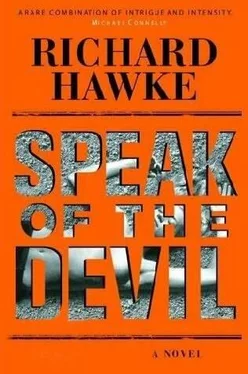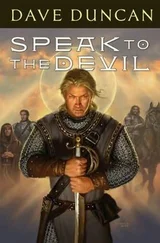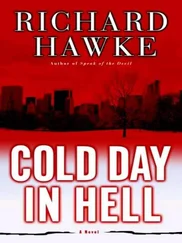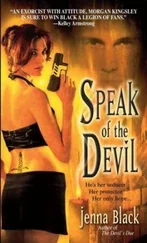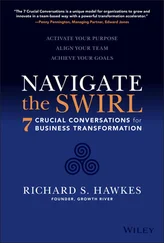“You know, when we were kids, I liked her. She was my only cousin, and we used to play together. Maggie kind of dropped me once she became a teenager. I guess that’s normal, I don’t know. She was getting into boys. Shit. Like I’m suddenly a frog or something? Aw, man, Uncle Ronnie and Aunt June. That nigger breaks in and kills them in their frigging beds. This is me rotting in hell again, man, but I wish he’d dragged Maggie out from under her bed and killed her, too. Why not? She’s dead now anyway. But at least my old man would’ve been spared all that crap.”
He threw his cigarette away in disgust. I half expected him to grab up the chain saw and start to work on the retaining wall. Instead, he stared off into space.
I looked past him to the river. Halfway across, a barge was being nudged upriver by a towboat. I don’t know where they came up with the name “tugboat.” I’ve been staring all my life out at the water that runs around this island, and not once have I ever seen one of those boats tugging anything. They push . They settle up against the rear of something fifty times their size, and they start pushing. I know it’s a metaphor for something, but in all these years, I’ve never quite placed it.
James King was not Nightmare. He was describing nightmares, but that was as far as it went. He told me that he had taken Margaret’s suicide note because he wanted to plunge a knife into it, to rip it into a hundred shreds, to spit on it and burn it. Phyllis Scott would no doubt posit that King had some “unresolved issues.” Sadly, ravaging his cousin’s final words probably hadn’t given the man anything near the “closure” he sought. I was looking at an open wound sitting on the retaining wall. Open and oozing and aching.
But I wasn’t looking at Nightmare. James King wasn’t holding Philip Byron. He wasn’t playing puppet master to Angel Ramos. When I’d checked in with the Parks Department administrative office at the Arsenal, I’d been told at first that James King was out of town, on vacation in Florida. A second look at the records had shown that-no-his vacation had ended just the day before. Monday. He’d remained in Florida an extra day to avoid traveling on the Sunday after Thanksgiving. Today was King’s first day back at work. King confirmed that for me. So did his sunburned face.
But even more than all that was the simple fact that he made no effort whatsoever to disguise a character that seemed all too capable of going to a very dark place and considering very dark deeds. Charlie Burke says to doubt everything. Fine. But James King gave me nothing to doubt. He pleaded guilty to ongoing rage and to an impotent act of revenge on his cousin’s suicide note. More than the fact that he had been more than a thousand miles away during the past week of carnage, those were his alibis.
I thanked him for his time. He placed his hands behind him on the wall and leaned back. For a moment I thought he was going to swing his legs over his head and follow his cousin to the grave. He looked miserable.
He looked off to his left. “Funny,” he said.
“What’s funny?”
“Nothing, really. I was just thinking about Maggie. She was a drunk, you know.”
“I know about that.”
“Yeah. A drunk and a nun and now dead. Some life. Back when she was a teenager, after my aunt and uncle were killed and everything? Before she got attacked and accused my father of being the one who did it, we kind of got to be friends again. For a little while. She really needed someone to talk to. For a while, it was me.” He stroked his mustache as his thoughts turned a little more gently to the past. “She had a huge crush on the guy who prosecuted her parents’ killer. Huge crush. She was all of sixteen and seventeen, and she kept telling me how she was in love and she bet he was in love with her, too, and how one day they’d get married and everything would be great. She’d be the queen in her castle. You know how girls can get.”
“Sure,” I said. From just outside the park, I heard several sirens. Police. Ambulance. I couldn’t say which. From the corner of my eye, I saw two men in suits take off running in the direction of York Avenue.
King picked up the chain saw and cradled it in his lap. A second set of sirens kicked up. These seemed to be coming from the direction of Gracie Mansion. King hoisted the chain saw up onto his shoulder as if he were Paul Bunyan. A smirk of sorts-it was hard to tell-appeared beneath the mustache.
“If Maggie’s dreams had come true, none of that other stuff would’ve happened. Maybe my father’d still be alive.” This time he let out a small laugh. “And Maggie’d have been a big deal. Queen of the whole city.”
“What do you mean?”
Something was definitely going on. A cop on a bicycle was pedaling our way as fast as he could.
“The prosecutor,” King said. “Maggie’s dreamboat. That was Martin Leavitt. He was a big hotshot in Brooklyn at the time. Mr. Law and Order. If she really could’ve landed him, she’d be fat and happy now. It would’ve all been different, just like she said. Up at that mansion. Might not be a castle, but I’ll bet Maggie’d have been all right with that.”
“Leavitt?”
The bicycle cop flew by, his legs pumping like twin pistons. His face was a mask of grimness.
King slid off the wall. “Hey, man, where’s the fire?”
Still more sirens sounded. I wheeled around. The feeling came over me again, the one like I was in a tunnel. I was standing stock-still, but it felt like everything around me was rushing past at breakneck speed. It was enough of a feeling that I must have staggered. King grabbed hold of my arm.
“Hey, man, are you okay?”
PIER 17 JUTS OUT INTO THE EAST RIVER JUST A FEW BLOCKS NORTH OF Wall Street. Until the early eighties, it was just one more on the growing list of Manhattan’s abandoned piers, home to seagulls, drunks, junkies and a few gay men looking for another few gay men. The only feature of note was the nearby Fulton Fish Market, which operated out of mainly open-air stalls located along the water running north from the pier, primarily in the shadow of the elevated FDR Drive.
That all changed when an urban development group called the Rouse Company struck a deal with the city to develop the pier, along with a portion of the real estate adjacent to it, for commercial purposes. They called it the South Street Seaport. The original vision of the Rouse Company was an urban mall stretching all the way north along the river to the Brooklyn Bridge, a quarter mile away from the pier. This plan, however, would have required more cooperation from the people who controlled the Fulton Fish Market (a loose consortium of Chinese and Italian mafia, along with, of course, the fishmongers themselves) than those people were willing to provide. So the plans got scaled back somewhat. The Rouse Company recobbled the foot of Fulton Street and renovated the existing buildings, most of which dated back to the seventeen hundreds and the area’s heyday as the city’s thriving boatbuilding district, but which, like the piers, had become increasingly ghostlike over the years as New York’s maritime identity diminished. Vintage streetlamps were installed, and a general “Ye Olde” flavor was mandated for the signage of the merchants who were subsequently lured to the area.
Meanwhile, out on Pier 17 itself, a three-story glass and metal structure was erected. A pavilion. A faux-weathered brass roof was bolted into place, and there it was: a large, light-filled shopping mall on Manhattan’s East River. The Gap, Sharper Image, Banana Republic… only a shut-in or an isolated Montanan doesn’t know the general run of stores that populate these kinds of places.
Читать дальше
